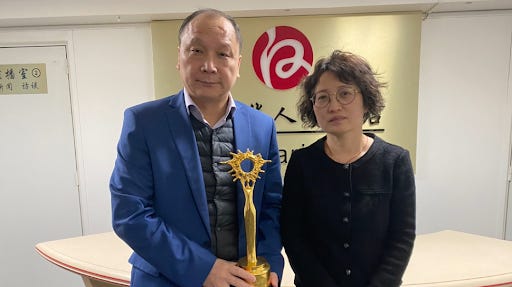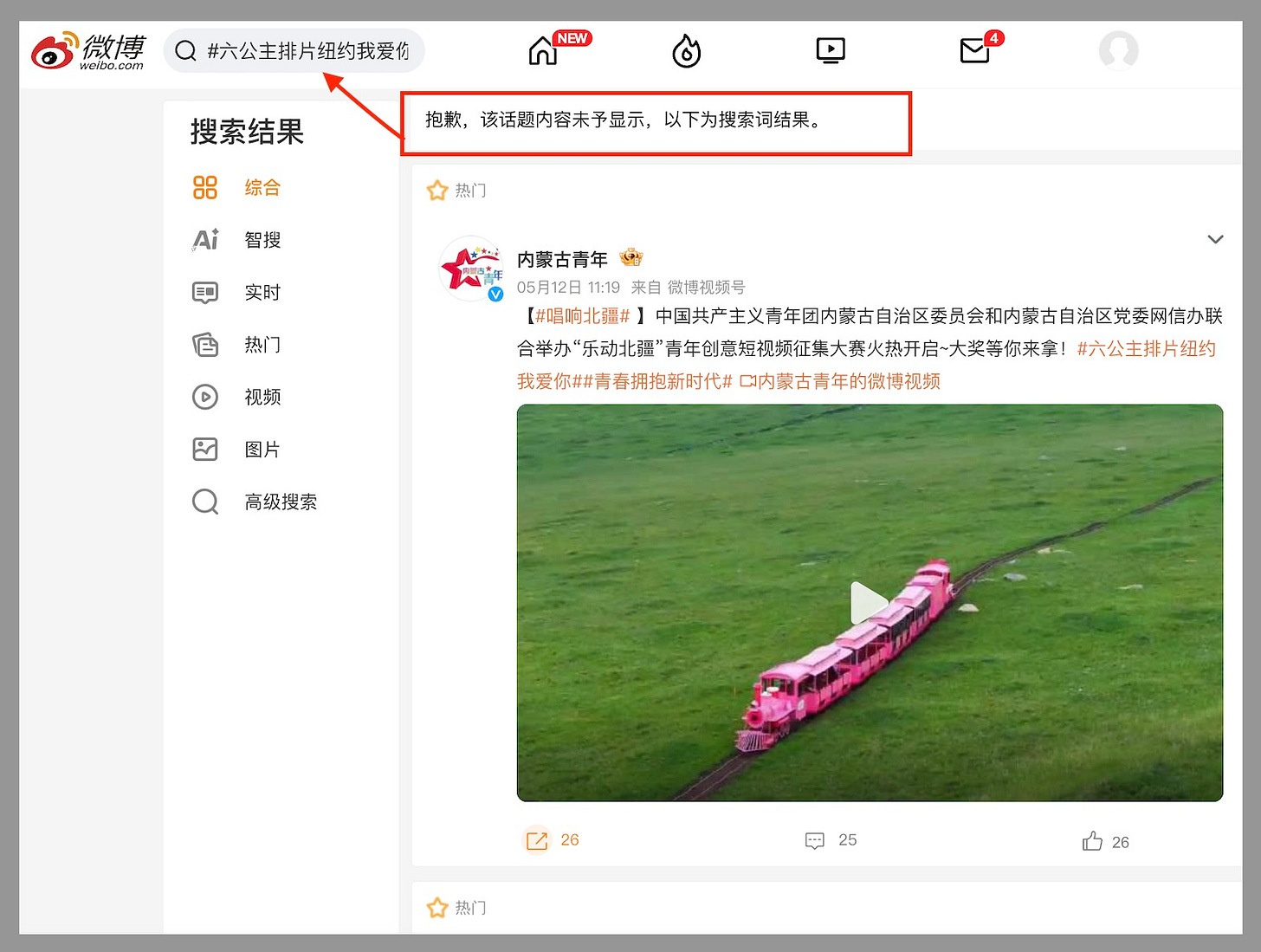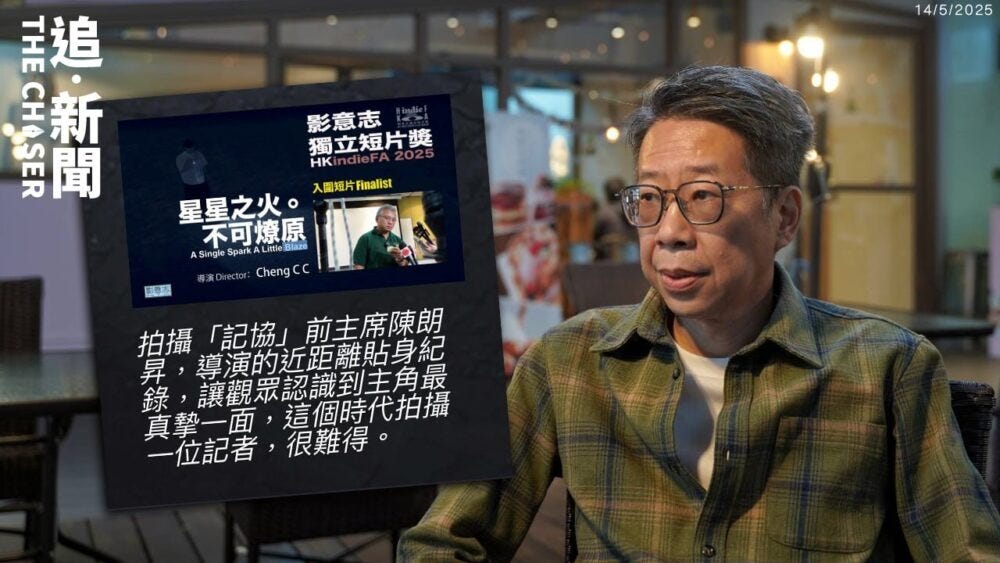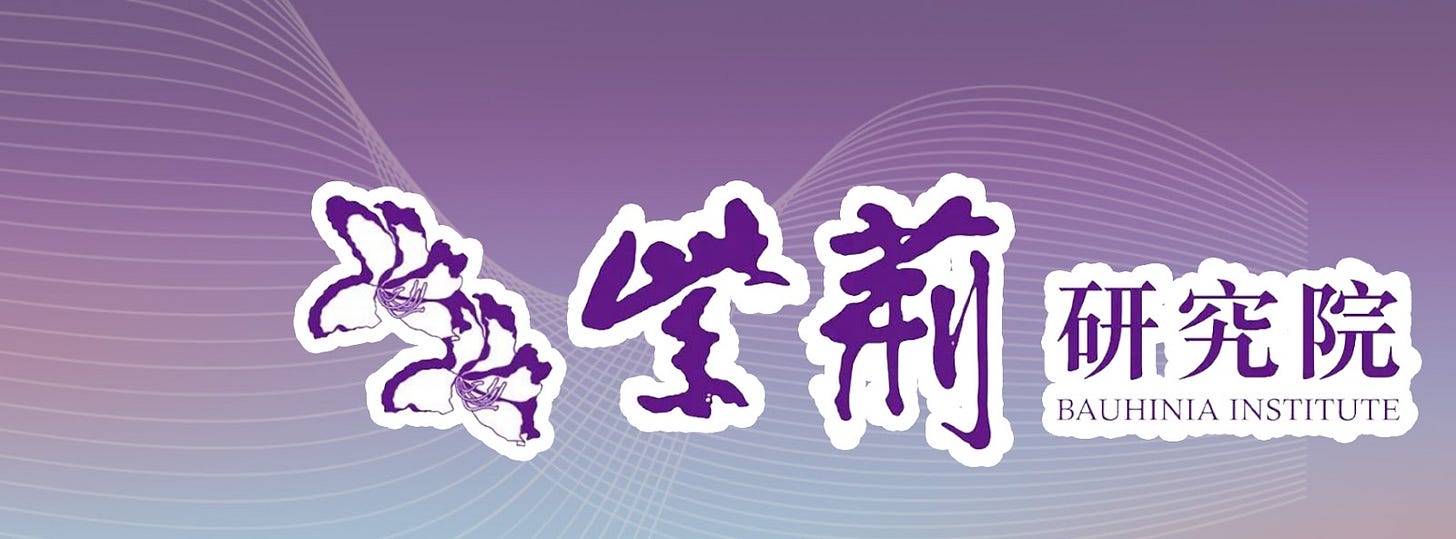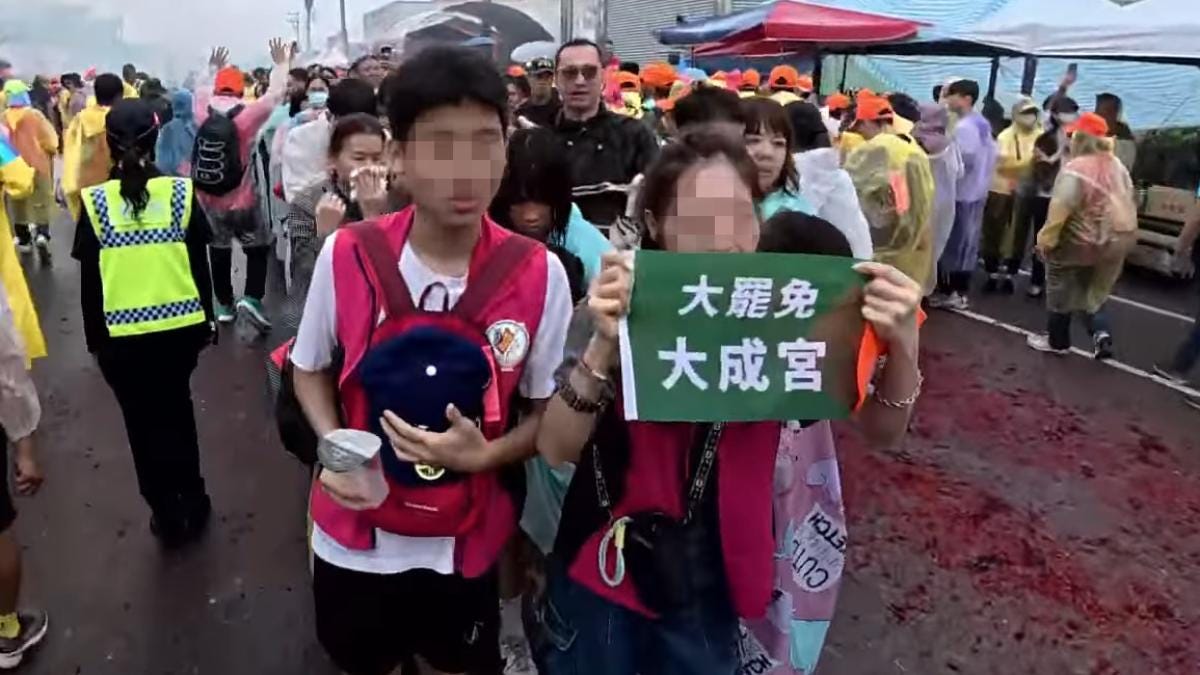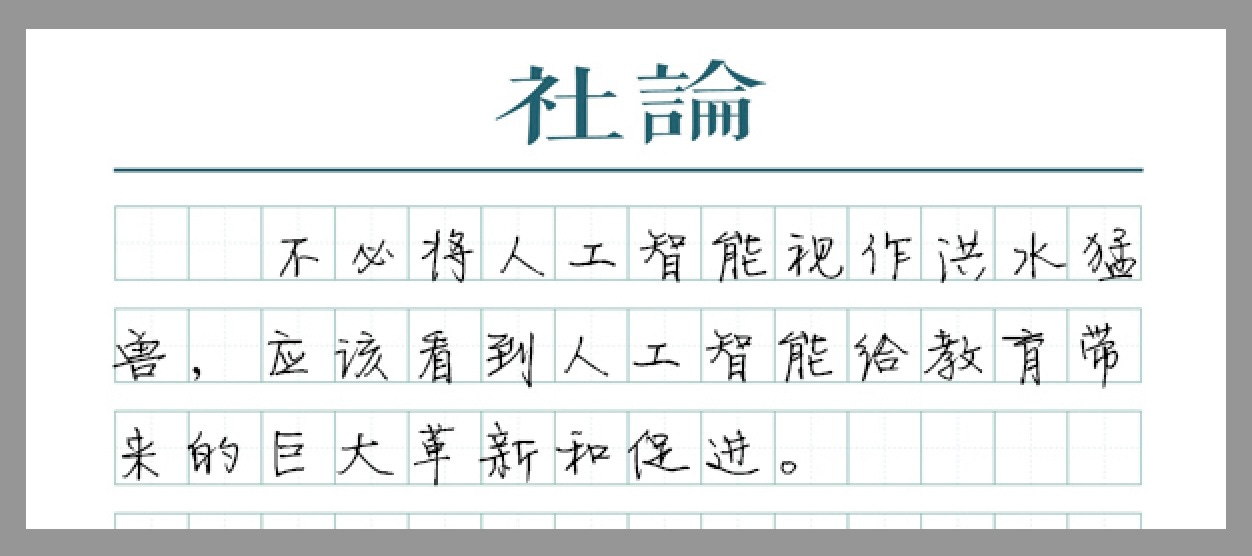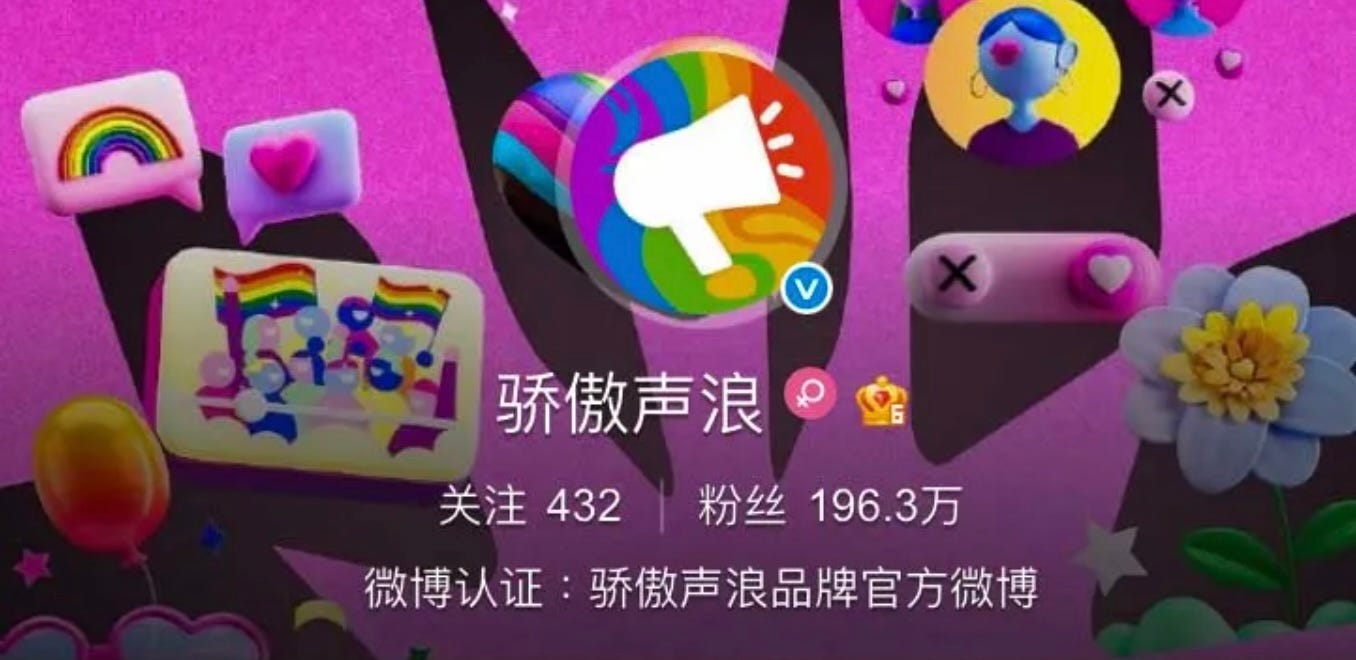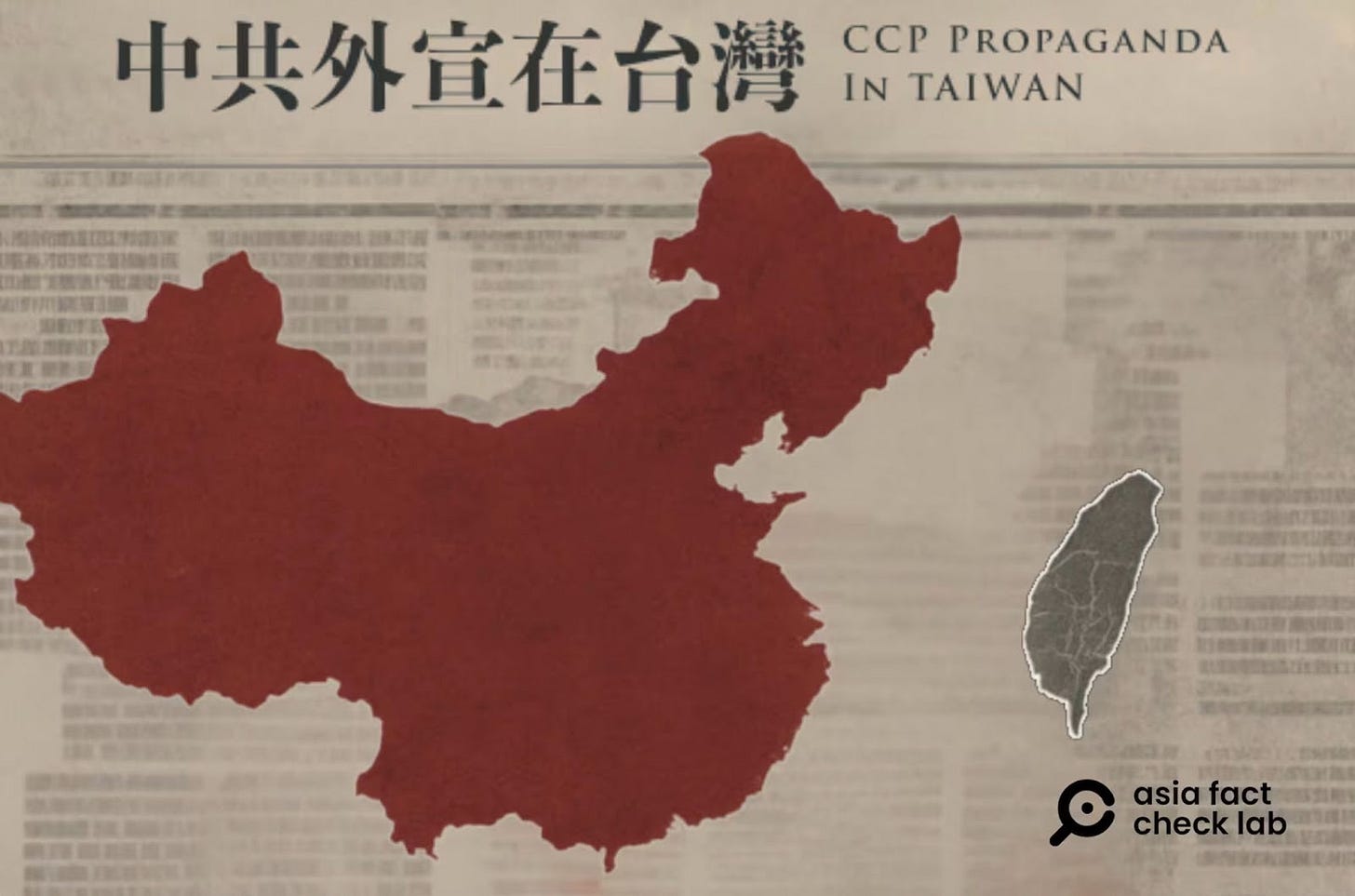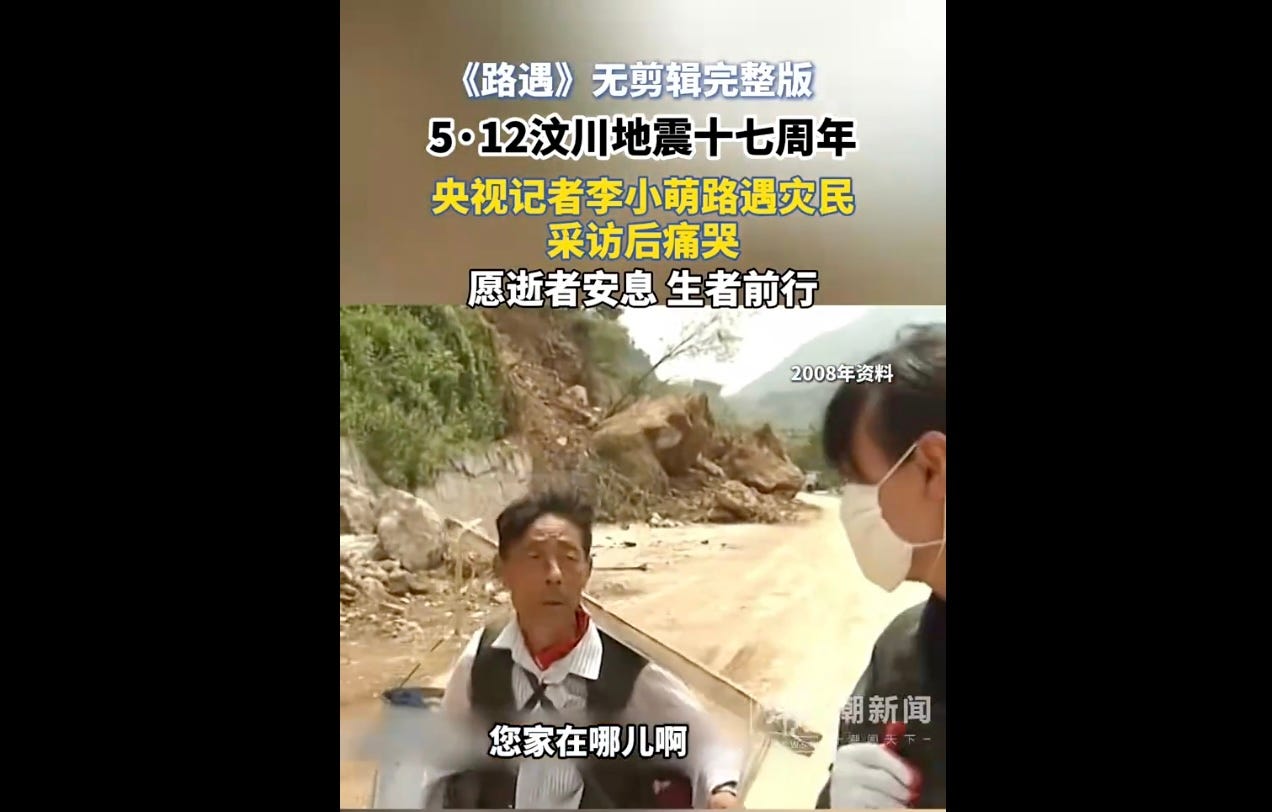Lingua Sinica Newsletter, 16 May
News, analysis, and commentary on Chinese-language media from the PRC and beyond.
Welcome back to Lingua Sinica.
This week's newsletter is full of stories across the Chinese-language media landscape. Even so, we had to be selective, and the stories are constantly breaking. A case in point: the news yesterday that former CCTV journalist Chai Jing's (柴靜) 2013 memoir Seeing (看見) has been ordered removed from all Chinese online retailers.
Beijing Beibei Consulting (北京貝貝特出版顧問有限公司), a book distributor under the Guangxi Normal University Press reportedly issued the recall notice citing "quality issues" — although the bestseller has been sold for more than a decade without incident. The timing is certainly significant. Chai, once a celebrity anchor whose work inspired a generation of aspiring young journalists, has recently emerged as an independent media voice from outside China through her YouTube channel. One recent video, an interview with a Taiwanese veteran about the brutality of the Chinese Civil War, surpassed one million views online.
In a recent edition of Lingua Sinica we covered Chai Jing’s hour-long video special where she interviewed Chinese fighters on both sides of the war in Ukraine. Fortunately, our team over at Tian Jian (田間) has managed to pick up a copy of Chai's book. We encourage Chinese readers to subscribe to their Substack and stay tuned.
But enough from me. On to our selection of stories.
Enjoy!
David L. Bandurski
CMP Executive Director
(NOT) IN THE NEWS
Schedule Shift
A themed choice on the film schedule of China's state broadcaster amid the warming of US-China trade relations was quietly substituted after briefly trending on Weibo.
When the United States and China reached a temporary agreement to lower tariffs by 115 percentage points this week, China's state broadcaster CCTV appeared ready to mark the diplomatic thaw. The network's film channel CCTV-6 (nicknamed "Princess Six" (六公主) by Chinese viewers) had originally scheduled the anthology film New York, I Love You for Monday evening, according to screenshots of the program guide shared by the official Weibo account of “Changjiang Cloud” (長江雲), an outlet under the state-run Hubei Television.
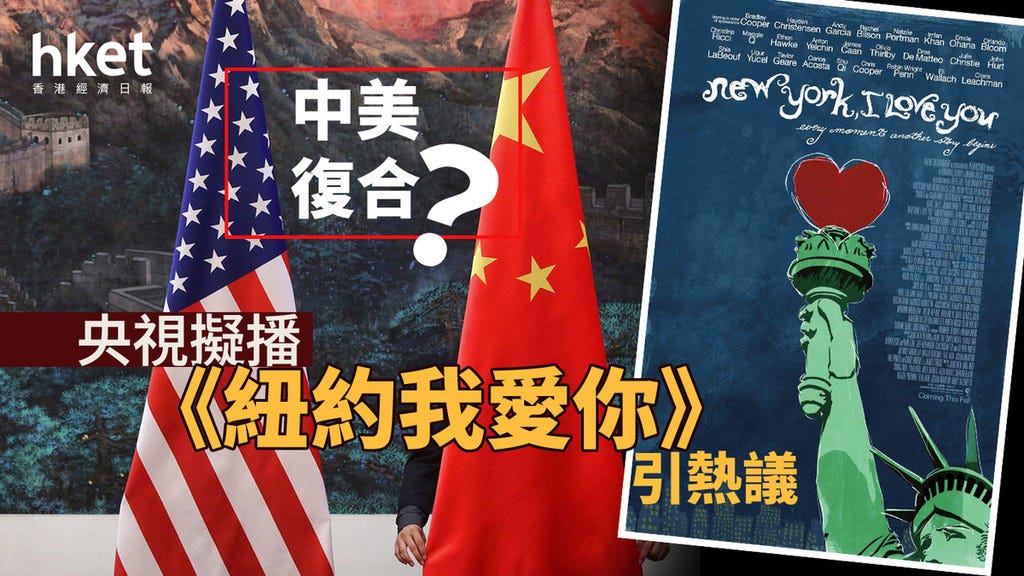
The scheduling choice quickly sparked a trending topic on Weibo, with some commenters noting the contrast to 2019, when the channel aired films like Battle of Triangle Hill, a nationalistic 1956 propaganda classic on volunteer Chinese soldiers fighting the US during the Korean War, in the midst of heightened trade tensions. "I thought we'd be watching Shangganling for a while, didn't expect we'd already be watching New York, I Love You," one internet user remarked. CCTV-6 has a well-documented history of using film selections as political signals.
The celebration of warming relations was short-lived, however. By noon, the Hubei Daily (湖北日報), a provincial-level CCP-run newspaper, reported that the channel had revised its schedule, replacing the New York-themed film with the Italian comedy Welcome to the South (later reports indicated it was changed to Camille). The Weibo hashtag "Six Princess schedules New York, I Love You" (六公主排片紐約我愛你) was subsequently censored, disappearing from the platform's trending topics. While some entertainment-related individual posts using the hashtag could be located on Weibo, clicking on the hashtag for the main related page yielded the message: "Sorry, the content of this topic is not displayed, below are search word results" (抱歉,该话题内容未予显示,以下为搜索词结果). Ironically, as UDN (聯合報) noted, New York, I Love You actually opens with a short film directed by renowned Chinese filmmaker Jiang Wen and starring American actress Natalie Portman—a perfect symbol of "China-US cooperation."
TRACKING CONTROL
Festival Fears
A Hong Kong documentary is withdrawn from a festival after subjects face unspecified "pressure."
A documentary about a prominent Hong Kong journalist has been pulled from an international film festival, offering a stark reminder of the territory's constricting space for artistic expression. "A Single Spark A Little Blaze" (星星之火・不可燎原), featuring former Journalists Association chairman Ronson Chan (陳朗昇), was withdrawn from all screenings of the inaugural Ying E Chi Independent Short Film Award after "interviewees faced pressure," organizers announced Tuesday.
"We remain in Hong Kong. If trouble comes, it could destroy families and separate loved ones," Mr. Chan told Photon Media (光傳媒), a Hong Kong exile media outlet, explaining his reluctance to detail specific threats. The film was among 12 finalists selected from 165 global submissions by Hong Kong filmmakers. Vincent Chui (崔允信), former artistic director of Ying E Chi (影意志), expressed deep disappointment but maintained optimism that the work would eventually be shown in Hong Kong. “I’ve always believed that day will come,” he was quoted as saying in Chaser News, another exile outlet.
Chui’s organization, which relocated to Taiwan after disbanding in Hong Kong last October, still plans to hold screenings in Taiwan, the United States, Canada and Britain next month.
Walls Within Walls
A new study finds that the GFW is an interlocking system of walled-off compounds.
From the outside, China’s so-called “Great Firewall” (GFW), a network of regulations and digital controls the Chinese government uses to restrict content in cyberspace, can appear monolithic — uniformly blocking global websites within the country. But there are wheels within wheels — or rather, walls within walls. An investigation published this week by a team of US researchers, including from the censorship monitoring platform GFW Report, concluded that Henan province has erected its own additional firewall that blocks up to 10 times more websites than filtered by the national firewall.
The team followed a trail of breadcrumbs from Chinese developers, who posted on coding forums like GitHub that they had spotted websites openly available in the rest of China that suddenly went down if they were in Henan. The report tests website access on servers in multiple regions, including Beijing, Shanghai, Guangdong and Jiangsu. The report notes that whereas the national firewall disproportionately targets websites surrounding pornography and news, business and finance received the largest share of blocks within the Henan firewall. The report surmises this could be because the province has previously been hit by a number of corruption scandals in state-controlled banks that have jeopardized social stability, such as the Henan banking crisis of 2022. “It is very probable that the state wants to limit access to information that is relevant to the economy of the area,” the report suggests. Information control targeted to particular provincial sensitivities is an interesting development in China’s digital censorship.
MISDIRECTIVES
Unmasking China’s Ranking Rejection
Chinese state-run outlets in Hong Kong have launched a coordinated response against Reporters Without Borders after it ranked Hong Kong at 140 on its 2025 World Press Freedom Index — downgrading the city to its "very serious" category for the first time. The Ta Kung Pao (大公報) criticized RSF for "distorting facts" and "misrepresenting the truth," while the Wen Wei Po (文匯報) claimed RSF views Hong Kong through an "ideological lens" that deliberately magnifies isolated cases. Meanwhile, pro-establishment lawmaker Elizabeth Quat (葛珮帆) accused RSF of "double standards," citing a survey by the Bauhinia Institute (紫荊研究院) claiming 62.5 percent of Hong Kong residents believe the Basic Law (基本法) effectively protects press freedom.
Citing this source may actually support RSF’s basic concerns, however. The Bauhinia Institute, founded in 2016, is closely associated with the central government’s Liaison Office in Hong Kong. The company’s director and 100 percent shareholder is Zhang Chunsheng (張春生), a former Xinhua News Agency journalist who later joined Wen Wei Po and for many years was a top executive at the central government-run Bauhinia magazine.
RSF defended its methodology, noting that at least 28 journalists have been prosecuted and 10 remain detained since the implementation of national security legislation in 2020.
FLASHPOINTS
Sacred Politics
Taiwan's revered Mazu pilgrimage becomes embroiled in cross-strait tensions and domestic recall campaigns.
Controversy erupted last weekend during a major Taoist celebration in Taiwan as religion clashed with divisive politics. According to initial media reports, the palanquin bearing the sea goddess Mazu on her annual procession from the Gongtian Temple in Baishatun (白沙屯媽祖), a coastal township in Miaoli, abruptly changed directions as it was confronted by a woman holding up a green poster promoting the "Great Recall" campaign, an ongoing wave of campaigns across Taiwan to remove newly-elected legislators through citizen petitions.
Since 1863, when the celebrations began, the annual procession path of the Baishatun Mazu as she is borne aloft by a team of carriers has always been unpredictable, but in this case some played up her apparent rejection of a prevailing trend in Taiwanese politics.
Not so fast, said a group behind the recall campaign, which called the case an effort at manipulation by "people with ulterior motives" (有心人士) who were "unfairly implicating Mazu" in politics. Meanwhile, the Liberty Times (自由時報), a paper generally thought to have a more pan-green stance favoring the ruling Democratic Progressive Party (DPP), reported "exclusive" allegations that members from Fumei Temple (富美宮) in China's Fujian province had taken part in the pilgrimage without required approval, visiting local temples and community representatives. The implication — though no compelling proof was presented — was that this was an inside job, perhaps even involving efforts from the PRC.
In response to media reports, Taiwan's Mainland Affairs Council (陸委會), a cabinet-level administrative agency that oversees cross-strait relations, confirmed they had not received exchange applications from the Chinese temple and pledged to "strictly investigate" united front activities, referring in this case to efforts by the Chinese Communist Party (CCP), usually through its United Front Work Department (UFWD) to exert covert influence on the public in Taiwan.
AI TRENDS
Education+
China hopes that advancing AI in education can spark critical thinking, but the limitations to innovative thought have never been technical.
As China's concerted national "AI+" campaign to leverage the technology for national development has begun to reshape educational priorities in the country, The Paper (澎湃新闻), a Shanghai-based media outlet under the state-run Shanghai United Media Group, published a commentary this week that endorses the country's new AI education guidelines, released earlier this month. The commentary argues for a "human-centered" perspective that balances technological adoption with critical thinking, explicitly rejecting fears of AI. "It is not necessary to view artificial intelligence as a menacing flood," the editorial said, addressing concerns about how AI might affect students' learning abilities.
The commentary argues that AI will improve China’s education system by pushing it to “focus more on cultivating children's independent thinking and innovation abilities, applying knowledge to practical life, and transforming knowledge into true wisdom." Since the launch of “AI+” — a government campaign to inject AI into every area of Chinese society and industry — Chinese state media have been touting a positive outlook on the emerging technology. This includes the government’s bold overhaul of the nation’s education system, angling it towards AI.
It bears noting that while China has officially invested a great deal of hope in AI as a driver of advancement in many areas, the challenges facing education — and in particular critical thinking — stem not from technical limitations, but from political restraints on speech and truth-seeking.
For more on AI and education in China, read CMP’s “China’s AI Job Mirage” and “Shrinking Humanities for AI”. For more thoughts on critical thinking in China, see our past interview with Lan Fang and Guo Zhaofan.
SPOTLIGHT
Queer “Comrades” Pushed to Rebrand
Initium Media report reveals growing censorship of LGBTQ+ accounts on Chinese social platforms.
This month, Singapore-based digital news outlet Initium Media (端傳媒) published a detailed report on the rapidly diminishing landscape for LGBTQ+ social media accounts in China. The report highlights how Chinese platforms are tightening their grip on content from sexual minority communities, employing both overt censorship and more covert algorithmic methods of suppression.
In one of the clearest recent cases of suppression of social media accounts, the well-established LGBTQ+ account "Comrade Voice" (同志之聲) was pressed to rebrand as "Pride Waves" (驕傲聲浪) in April this year after a public uproar alleging that the platform’s use of “comrade” was offensive to the country’s national identity as a communist state. The word “comrade,” or tongzhi (同志), has been used within the LGBTQ+ community in Taiwan, Hong Kong and China since the 1990s. The uproar over "Comrade Voice," which has nearly two million followers on Weibo, began when scriptwriter Wang Hailin (汪海林) made offensive remarks about gay men. After the account protested, Fudan University professor Shen Yi (沈逸) led critics who claimed this polluted Communist terminology. Facing the demand that it rename itself "Homosexual Voice" (同性戀之聲), the account opted for "Pride Waves" instead.
According to Initium's report, authorities have recently employed accusations of "foreign influence" (境外操控) as a powerful tool to restrict LGBTQ+ advocacy, though there is no credible evidence for such claims. Facing the generalized pressure caused by such claims, several organizations have renamed themselves, altered their content, or ceased operations entirely. Some have also chosen to defend themselves by signaling compliance. Amid claims of foreign influence, “Comrade Voice” founder Hua Zile (花子樂) defended the account, stressing that it had never sought or received foreign funding. At the same time, however, Hua affirmed support for the CCP and socialist ideals.
SHORT STORIES
| Taiwan |
Propaganda Playbook
The Asia Fact Check Lab has published an 11-part investigative report series as an e-book detailing China's propaganda operations targeting Taiwan. The reports expose what they call the "Fujian Network" (福建網絡), comprising the Fujian Daily Newspaper Group (福建日報報業集團) and Fujian Broadcasting and Television Group (福建廣播影視集團), both provincial-level media groups under control of the local CCP committee. The e-book alleges that the media groups coordinate cross-strait united front activities. According to the investigation, these entities pay local content creators to produce content advancing pro-China narratives. In a news report about the AFCL study, the Liberty Times (自由時報) reported that Chiu Chui-cheng (邱垂正), minister of the Mainland Affairs Council, described Fujian media as "the forward base for united front media operations against Taiwan.”
Smoothie Diplomacy
Former Taiwanese president Tsai Ing-wen (蔡英文) created a viral moment during her European tour when cameras captured her confidently downing a green smoothie at Leafood, a Taiwan-Lithuania agricultural venture. The image was widely covered by media outlets from the DPP-leaning Liberty Times (自由時報) to Taiwan's Central News Agency (中央社). It quickly spread across social platforms, garnering over 60,000 Facebook likes. On her Facebook post, commenters marveled at how she could "make drinking a green latte look like wine tasting" and praised her "natural and unpretentious" demeanor. This adds to what netizens call the "Tsai meme series" (小英迷因哏圖系列), a collection of candid moments that have endeared the former president to younger generations. For more of Tsai's memorable memes, see this Threads post.
| China |
Military Mystery
Nearly all news reports about He Weidong (何衛東), vice chairman of China's powerful Central Military Commission (中共中央軍委副主席), have been removed from the website of the country's defense ministry, fueling speculation that he has fallen from grace. According to ETtoday (東森新聞雲), the removal of He-related content likely occurred last Friday, May 9. A search for He's name on the ministry website now yields only three results — all biography pages — compared to 203 results for fellow vice chairman Zhang Youxia (張又俠). TaiSounds (太報) reports that just one article remains about He, dated March 10, describing him presiding over a military delegation meeting. He has not made any public appearances since the closing of the National People's Congress on March 11 this year. The Financial Times reported back in April that He was dismissed on corruption allegations, potentially making him the first Central Military Commission vice chairman to fall while in office since China's reform and opening up.
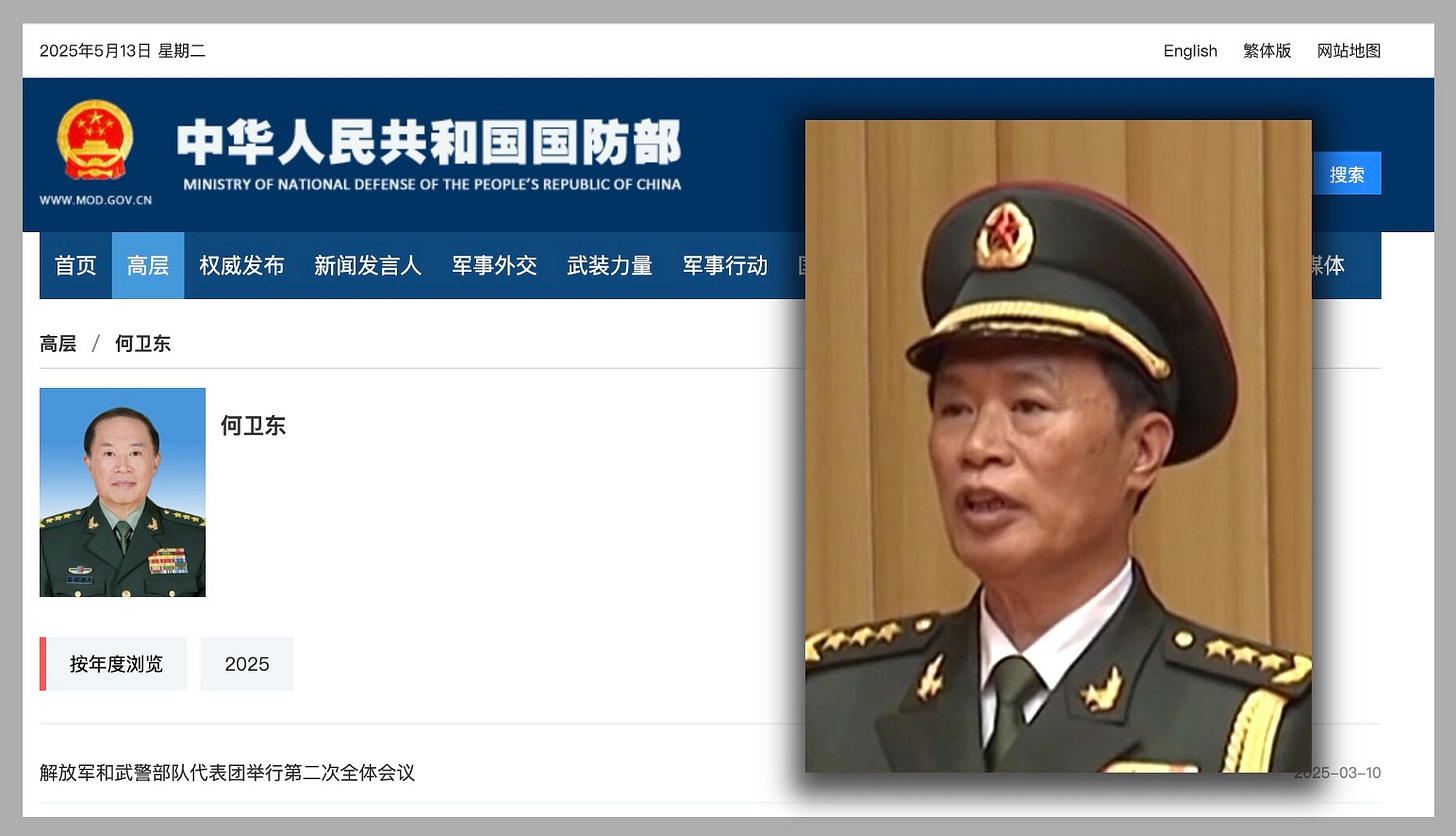
Surrogacy Operation Uncovered
Elephant News (大象新聞), a platform operated by Henan Broadcasting System, has collaborated with anti-human trafficking activist Shangguan Zhengyi (上官正義) to expose an illegal surrogacy lab in Changsha, Hunan province. Their undercover investigation revealed a makeshift facility equipped with wards, operating theaters and a laboratory. Among the nine women found at the site was a 41-year-old deaf-mute woman from Shanxi province who communicated via sign language that she had received 280,000 yuan ($38,600) for serving as a surrogate mother. The circumstances suggest possible coercion, as she indicated being brought to the facility by "outside people" (外面的人) and seemed uncertain how long she had been there. Reporters documented vehicles delivering more than 17 women to the facility over two days. Elephant News has reported the case to authorities, and related hashtags including "Underground surrogacy handlers show strong counter-surveillance awareness," have trended on Weibo.
| Hong Kong |
A Swiss Pivot
Innes Tang (鄧德成), chairman of the oddly named Politihk Social Strategic (香港政研會), a pro-Beijing political organization in Hong Kong, told the BBC that he plans to establish a media company in Switzerland and register there as a journalist. According to a report by The Chaser News (追新聞), Tang serves as a United Nations representative for the International Probono Legal Services Association Limited (IPLSA), an NGO created by pro-Beijing Hong Kong legislator Junius Ho Kwan-yiu (何君堯). Tang drew ire last week when he told the BBC he had reported "nearly 100 individuals and organizations" to authorities for suspected National Security Law violations, though he now claims to have stopped such reporting activities as Hong Kong has returned to "balance and stability." He regularly attends UN meetings in Geneva to present China's position on Hong Kong, human rights, and other issues.
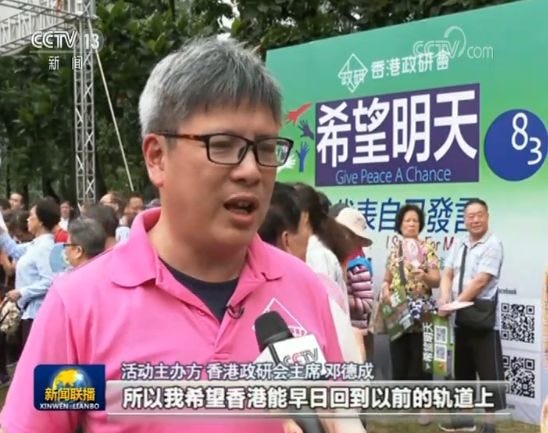
SELECTIVE MEMORIES
Redacting History
An old video surfaced this week to commemorate a devastating quake nearly 20 years ago. But key portions of the original were conspicuously absent.
Monday this week marked the 17th anniversary of the Wenchuan earthquake, a 7.9 magnitude tremor that devastated Sichuan province and tragically took the lives of nearly 100,000 people. On the anniversary this year, one particular Wenchuan-related item surged to the top of search engine Baidu and hot search lists on the social media forum Weibo. It involved a vox pops interview given on location one week after the 2008 quake by Li Xiaomeng (李小萌), a reporter from state broadcaster CCTV. In the old broadcast shared on social media on May 12, Li comes across a farmer known simply as "Uncle Zhu" (朱大爷) as she strolls along a collapsed mountain road. Speaking a local dialect, Zhu stoically tells the journalist about the appalling conditions in the area. Through an interpreter he explains to the reporter that he is returning home to harvest his rapeseed crops in order to "reduce the burden on the government" — meaning that he will have some income and not need to be totally dependent on aid. By the end of the interview the farmer is convulsed with sobs, the tragedy of the situation coming through.
Li posted this week on Weibo to commemorate the moment, revealing that Uncle Zhu passed away in 2011. She said: "That conversation, with its unexpected, banal but heartbreaking details, showed all of us in China that people like Uncle Zhu, with their calm acceptance in the face of catastrophe, have the backbone to do what is right." Other media, including China Youth Daily, an outlet under the Communist Youth League, built on Li's exchanges with the Uncle Zhu in the years after the quake to commemorate the anniversary.
But a key portion of the television exchange was edited out of this year's commemorative coverage. Near the midpoint of the original video, Li turns from her conversation with Zhu to interview several other farmers. One farmer explains that his child was killed in the earthquake, "buried in Beichuan First Middle School." This exchange referenced the widespread collapse in the quake zone of shoddily constructed school buildings, resulting in the death of thousands of children. Revelations of school collapses briefly drove a wave of public anger, and a burst of Chinese media coverage — before the authorities came down hard.
As Dalia Parete wrote last week for CMP, Chinese media are generally subject to strict controls when reporting on breaking disaster stories. but past disasters too are subject to careful narrative control, with inconvenient facts often erased from official memory.
CHAIN REACTIONS
Telling China’s Story in Paris
For a decade, this Paris-based broadcaster has made China’s message its mission.
Founded in 2015 by Chen Shiming (陳世明), a restaurant owner turned media entrepreneur, France-based Mandarin TV (歐視TV) — rebranded in 2021 from "French Chinese TV" (法國華人衛視) — makes little effort to disguise its ambition to serve the agenda of the Chinese state. The outlet describes its mission as "spreading China’s voice, telling China’s story well" (傳播中國聲音,講好中國故事) — language that mirrors the goal for external propaganda set out by Xi Jinping in August 2013, less than two years before Chen’s media outfit set up shop in Paris’s 8th Arrondissement.
In interviews with Chinese media, Chen has said he hopes his station can counteract what he says are deeply biased views toward China in France, his home for the past four decades. “I want to show the real China to the French," he told the Yueqing Daily (樂清日報), a county-level CCP-run newspaper in coastal Zhejiang province. The real China for Chen is apparently reflected by the country’s strictly controlled state-run media. As Chen himself acknowledged in a 2021 interview, the channel openly collaborates with central CCP media like China Central Television (中央電視臺) and China Radio International (中國國際廣播電臺), both under the China Media Group conglomerate directed by the CCP’s Central Propaganda Department. The channel has also cooperated with regional state broadcasters like Wenzhou TV (溫州電視臺).
Founded by through Chen’s C-MEDIA Group (歐洲中誼文化傳媒集團), and claiming to be the only Chinese-language television station authorized by France's media regulator Arcom, the station broadcasts 24-hour content, almost entirely from its Chinese state partners. The same state content, including from CCTV and Xinhua News Agency, fills its YouTube channel.
